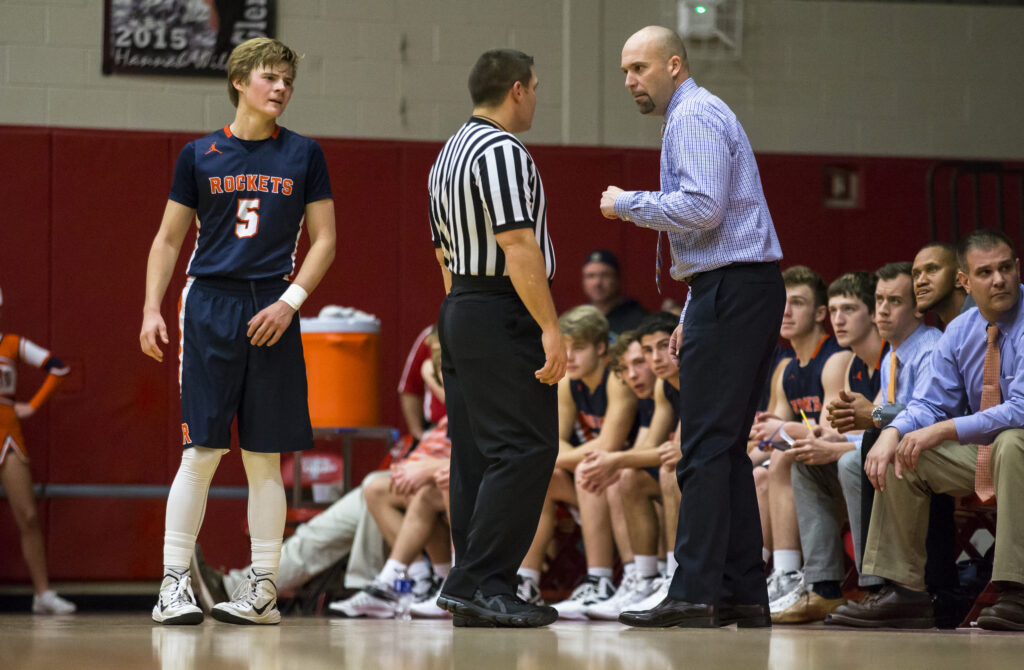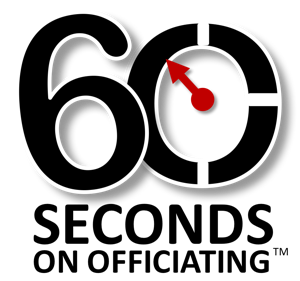
Do You Have a Question?
It’s important to be approachable as a crew … but what is the best way to respond to the head coach’s commentary? Here’s a few ideas that will help you in many conversational situations.
According to the NFHS Officials Manual, under the Game Management / Awareness section, crews should acknowledge head coaches and answer their questions at appropriate times. The manual goes on to say …
Do not respond to statements.
That’s a powerful statement in itself.
In a recent high school game, my crew was approached after the expiration of the 2nd period and during the time when teams are leaving the floor heading toward their respective locker rooms. As we were approaching the scorer’s table, the home coach took the opportunity to provide information (statements) regarding tactics he thought one of their opponents was doing, regarding the use of hands on his dribbler.
My partner politely said to the coach …”To discuss this, we need both coaches here.” Both the coach and Athletic Director could not understand why the crew was not receptive to this discussion.
In hindsight, we should have waited a moment more, staying across the court (from the scorer’s table) allowing both teams to clear that area, but instead we walked right into the “hornet’s nest.” Note to self: Lesson learned here.
Even though the coach was very polite — he was doing a few things that officiating crews should be aware of.
- Statements vs. Questions: In this situation the coach wanted to “plant seeds” for the 2nd half, regarding our application of a particular rule. While this sounds reasonable — the coach is simply making statements and not asking any particular question.
- Single Threaded Conversations: The NFHS manual also stipulates, “if an unusual situation warrants a conference BOTH head coaches should be involved in the discussion.” In this situation, while maybe not unusual, it was certainly one-sided and would have gone much different if both coaches were involved in this talk.
- Appropriate Time: The question really becomes, “what is the appropriate time” to be approached by a head coach. Time-outs and intermissions are really for the teams to be coached and the crews to huddle and prepare for the next segment of the game. In “my personal view” these are NOT times to be approached by coaches and be lectured on judgment or application of rules.
What should a good official do?
Here’s a few suggestions that will make the difference in your communication with coaches.
- “Do you have a question, coach? — is probably the best tool in my arsenal to disarm a situation. When coaches are bending my ear with statements and their viewpoint on the game, I simply look them in the eye, nod my head as to acknowledge hearing them, and respond simply with …”I understand. Do you have a question, coach?”
This can certainly be crafted to fit the situation, like — “Do you have a question on the traveling rule?” or something like that. Now sometimes a response might follow like, “Why is that not a travel” and that leads me to the next tip. - WIO (What I Observed) and BR (By Rule) — Whenever I respond to a coach’s specific question the letters, WIO come into my head. Coach, What I Observed was the dribbler (#5) lifted the pivot foot prior to the ball leaving their hand to start a dribble. By Rule, this is considered a traveling violation. Do you have any other questions on the traveling RULE? And stop talking.
By leveraging the word – “observed” your response is what you “actually saw” and is really not up for debate. What was observed (right or wrong) is-what-it-is. And tying back to the rule removed the “judgment” component.
A coach possibly will respond again with a statement — which you should acknowledge and ask again, “do you have any other questions, coach?” If not — move on. - Bringing Both Coaches Together — To build on the NFHS Official’s Manual (1.2.5), I always bring the two head coaches together to discuss any item that impacts BOTH teams. The manual states “If conditions warrant a conference, both coaches should be involved.” This can also be used if a coach is trying to “plant seeds” about their opponent to you.
As an example – If Coach A is chirping about their opponent’s actions, I might suggest a conference with Coach B to iron it out. Most times the complaining coach will stop their antics. Once I had a coach complaining the other team was “playing dirty.” I brought both coaches to the division line during a time-out, described what was said, then walked away to allow them to hash it out. Yes, that technique works.
To summarize, your best tool is to be approachable and respond to questions only. When head coaches barrage you with statements – be respectful, listen and ask … “Do you have a question?”

Since I learned it from you, I’ve been using WIO all the time… Good stuff…
Great article!!!